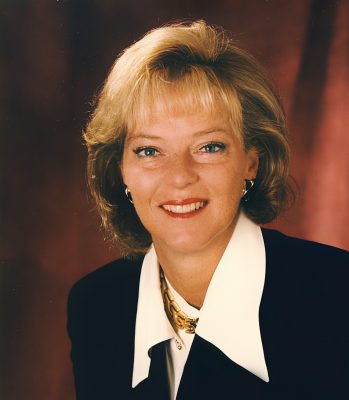Each issue, FlexPack VOICE® hosts a question-and-answer segment with an industry leader. In this issue, we interview Madeleine Robinson, CEO of LPS Industries, LLC, and a member of the FPA chairperson’s advisory council. Robinson was born in Boston but grew up in northern New Jersey, where she went to a private, all-girls Catholic high school in Montclair before going on to Georgetown University. She received an MBA from The Wharton School at the University of Pennsylvania. After starting her career on Wall Street, she eventually went to work at LPS, which was founded by her late father.
FlexPack VOICE®: What do you see as your primary role as CEO?
Madeleine Robinson: I need to keep the company growing and profitable, as well as making it a fun place to work. I need to make decisions that benefit both the employees and the customers. I need to continuously invest in the company. I have a fiduciary responsibility to my parents, my employees, my customers, and myself to provide good stewardship and provide excellence in all areas.
FPV: What are the biggest challenges facing the industry, as well as LPS?
MR: There are lots of challenges ahead for both the industry and LPS. The industry is under pressure because of the negative elements associated with plastics, which is a shame considering all of the good that plastics do in this world. The industry also faces a lack of talent—be it on the factory floor or the executive space and everywhere in between. Unlike the thoughts of Mr. Robinson in the movie “The Graduate,” plastics suffer an image problem, and so it falls victim to both the “all plastics are bad” as well as the “work-where-and-making-what” syndrome. LPS has additional challenges in that we are a medium-sized, privately held company amidst huge monster companies. This factor can be a double-edged sword, but I’d like to think of it more as a positive than a negative. LPS has taken many risks and invested both time and money into customers that admitted that they didn’t know if they could pay their bills. Some of those companies are now nationally known brands or corporations. I didn’t need to consult anyone about taking those risks, which is very satisfying. Needless to say, those customers are very loyal.
FPV: Talk a little bit about sustainability and LPS’ approach to this industrywide issue.
MR: LPS has a long history of embracing sustainability initiatives for our business. Our massive rooftop solar farm provides more than 30% of power to the facility, significantly reducing our carbon footprint. This was installed over 10 years ago, and was at the time, one of the largest solar facilities installed in New Jersey. We currently produce several environmentally friendly, recyclable packages and are in the midst of finalizing the trials on some compostable products.
“Even though there are challenges ahead, the growth potential is exciting. New things are being invented every day.”
FPV: What would you tell someone who is thinking about a career in the industry if they were asking for your advice?
MR: The packaging industry both survived and flourished during the pandemic, which is an indication that the industry is alive and well. Even though there are challenges ahead, the growth potential is exciting. New things are being invented every day. Many times you can solve a problem by designing a structure that will allow a great product to be brought to market. This is particularly rewarding in the medical area, but also is true for food, aerospace, agriculture, and other industries. Most people find this aspect of the business very rewarding. Finally, packaging pays well. Most companies are hungry for talent and appreciate input from new hires. Advancement can be swift, which is very attractive for today’s youth.
FPV: FPA started the Emerging Leadership Council to attract more students into the industry but also to cultivate a new generation of leaders. When it comes to hiring, what do you think works and doesn’t work?
MR: Hiring people is a very inexact science. I love to hire people who have a “can do” attitude. Aren’t afraid to get their hands dirty. Aren’t more concerned about their vacations than they are about their jobs. Intelligent but not elitists. Lots of common sense. Willing to work hard to attain goals. Where or if you went to school is less important than where you worked and what your previous/current job function entailed. I’ve met some of the most incredible people who never went to college but mastered a certain technical skill and brought a lot to the table. I never hire job-hoppers, and I keep the interview short when the first question concerns company benefits.
FPV: What about hiring for sales positions? What do you look for?
MR: Hiring salespeople is the bane of my existence. God love good salespeople. Very few college grads want to go into sales, even though this—in my mind—is a spectacular profession if you have what it takes. I’ve seen very different qualities in some great salespeople. “Openers” usually have spectacular personalities—not obnoxious—and would make great hunting dogs because they are able to find the decision makers within a company. Technical salespeople wow you with their knowledge. “Maintainers” are usually good listeners. “Closers” have the capability to wrap things up in a logical and persuasive way while politely asking for the sale. All good salespeople tend to share traits such as good organizational skills, quiet aggression, and the ability to see adversity and rejection as a challenge and an opportunity rather than a defeat.
